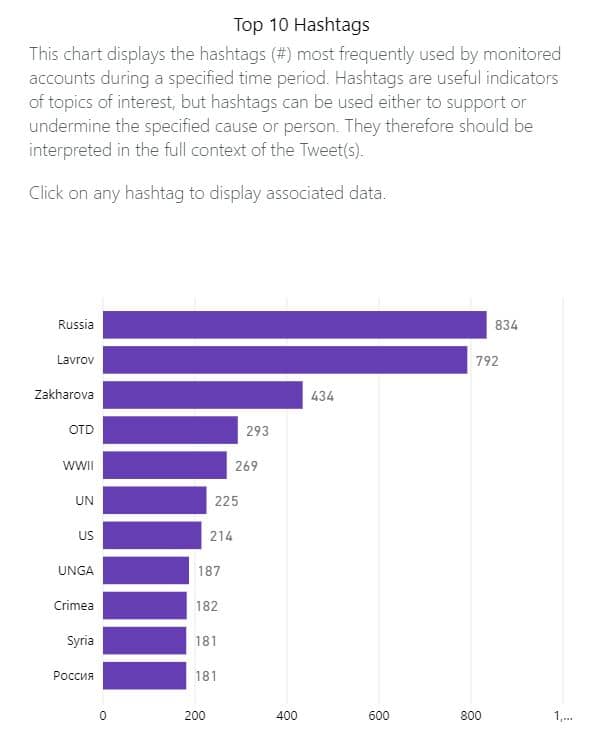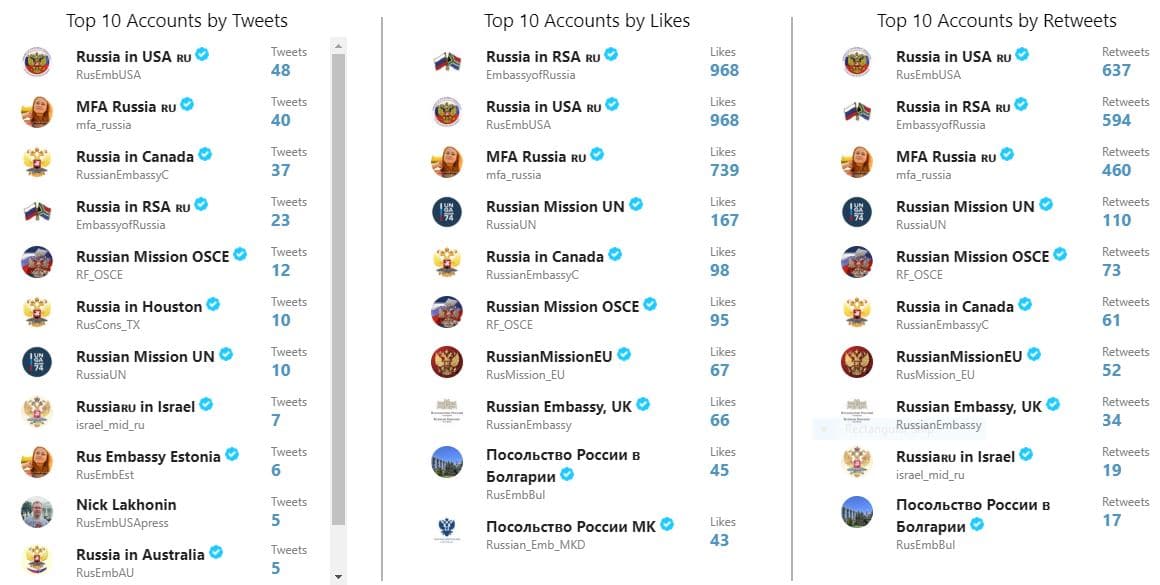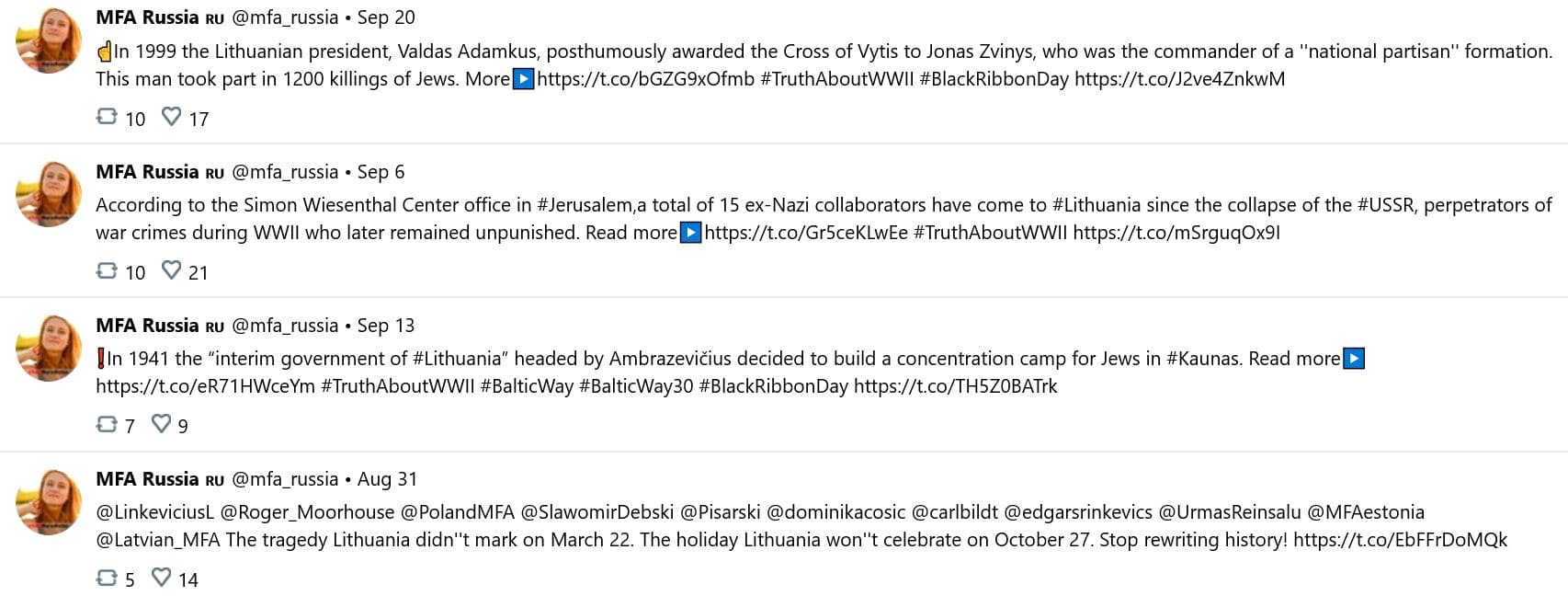Overview
The Russian government under Vladimir Putin has engaged in a prolonged effort to create a version of Russian history free “from internal contradictions and ambiguities.” But attempts to airbrush Russian history have recently become a messaging priority for Russia’s diplomatic and government messengers abroad as well, as evidenced by a recent Twitter campaign targeting #WWII historical narratives. The campaign – now in its 6th week – highlights the Russian government’s weaponization of historical memory in its ongoing information war with the West.
What We’re Seeing on Hamilton 2.0
Over the past month, diplomatic accounts monitored on the dashboard have engaged in a prolonged campaign to rewrite history, and glorify/whitewash the Soviets role in the war. The campaign began on August 19, when the Russian Mission to the OSCE’s Twitter account (@RF_OSCE) announced the launch of a “series of Twitter publications” under the hashtag #TruthAboutWWII.
Other Russian diplomatic accounts quickly joined the fray, tweeting a variety of pro-Russian takes on the Second World War – some touting cooperation with the West; some shifting blame to the Western allies for starting the war; but all presenting a mythologized version of Soviet involvement. As noted by DFRlab’s Eto Buziashvili, the most concentrated messaging campaign has focused on the 80th anniversary of the Treaty of Non-Aggression between Nazi Germany and the Soviet Union, better known as the Molotov-Ribbentrop Pact. The Pact was officially condemned by the Soviet Union in 1989, but Russia’s diplomatic messengers have adopted a new line: the Pact was a necessity after Soviet efforts to create an “anti-Hitlerite coalition” were “snubbed by the West.
Inside the Numbers
Between August 19 and September 26, Russian diplomatic accounts monitored on the dashboard used the #TruthAboutWWII hashtag 113 times and the #WWII hashtag 269 times, making it the 5th most-used hashtag during that period.
The most active diplomatic account in the #WWII campaign has been the Russian Embassy in the United States (48 uses), followed by the MFA (40 uses), the Russian Embassy in Canada (37 uses), and the Russian Embassy in South Africa (23 uses). To the uninitiated, the Russian Embassy in South Africa may seem an odd messenger for a campaign focused on a largely European historical memory, but the @EmbassyofRussia account has proven to be one of the more active agitators in Russia’s past trolling campaigns, regardless of the relevance of the topic to South Africans.
These results primarily reflect English-language outputs. Although Hamilton 2.0 auto-translates text, it obviously cannot take into account different localized hashtags used to convey similar messages. This is especially relevant with the #WWII hashtag, which would not resonate in countries that use a different term to describe the Second World War. However, a search of the Russian-language equivalent of #TruthAboutWWII, #правдавтороймировой, returned 32 results – seven of which came from the Russian Embassy in Latvia (@LV_RUSEMBAS), suggesting a targeting of the Russian diaspora. It also makes clear that the breadth of the Russian historical memory campaign extends far beyond the 269 #WWII tweets.
A further search of Russian embassy accounts in former Soviet or Soviet bloc countries (e.g., Hungary, Estonia, Czech Republic, etc.), shows an even more aggressive approach to revisionism; namely, efforts to paint many of those countries as collaborators or to stress that Eastern Europe was liberated rather than occupied by Soviet forces at the end of the war. Unsurprisingly, this effort has targeted the Baltics, where official World War II narratives remain highly controversial, and tensions remain between ethnic and Russian populations. The Russian Embassy in Estonia, for example, accused Estonia of “misrepresenting events” and falsifying history, while adding the hashtag #Bronzesolider, a reference to the controversial Soviet war memorial whose relocation sparked a riot in 2007.
The official Russian MFA account also targeted Lithuania, tweeting repeatedly about partisan complicity in the mass killing of Jews.
In a region where the scars of World War II and the ensuing Soviet occupation remain fresh, this approach is at best undiplomatic and at worst a dangerous provocation.
Why it Matters
Every country engages in some form of historical mythmaking. Yet the fact that Russian diplomatic accounts have engaged in a prolonged, coordinated, global historical memory campaign suggests that the Russian government is not only rewriting history to stoke Russian patriotism at home, it is also using it as a tool abroad. The distortion of the historical record is clearly seen as an increasingly important foreign policy tool to be wielded by the Russian government – whether to justify its involvement in the ongoing war in Ukraine, or to attack its critics. The #TruthAboutWWII campaign is therefore about more than advancing a pro-Russian historical perspective; it is an effort to undermine and weaken Western democratic alliance.
The views expressed in GMF publications and commentary are the views of the author alone.











